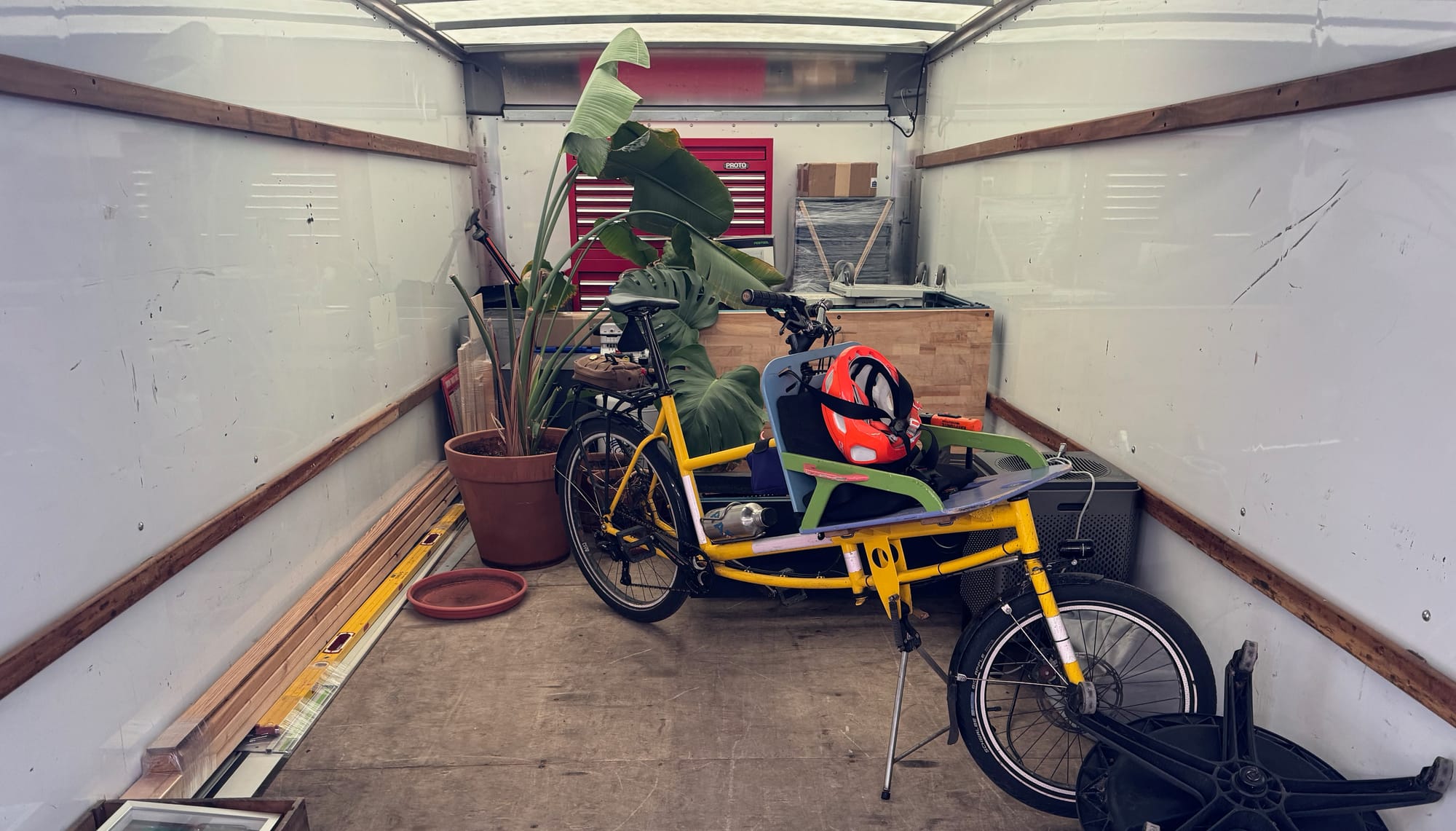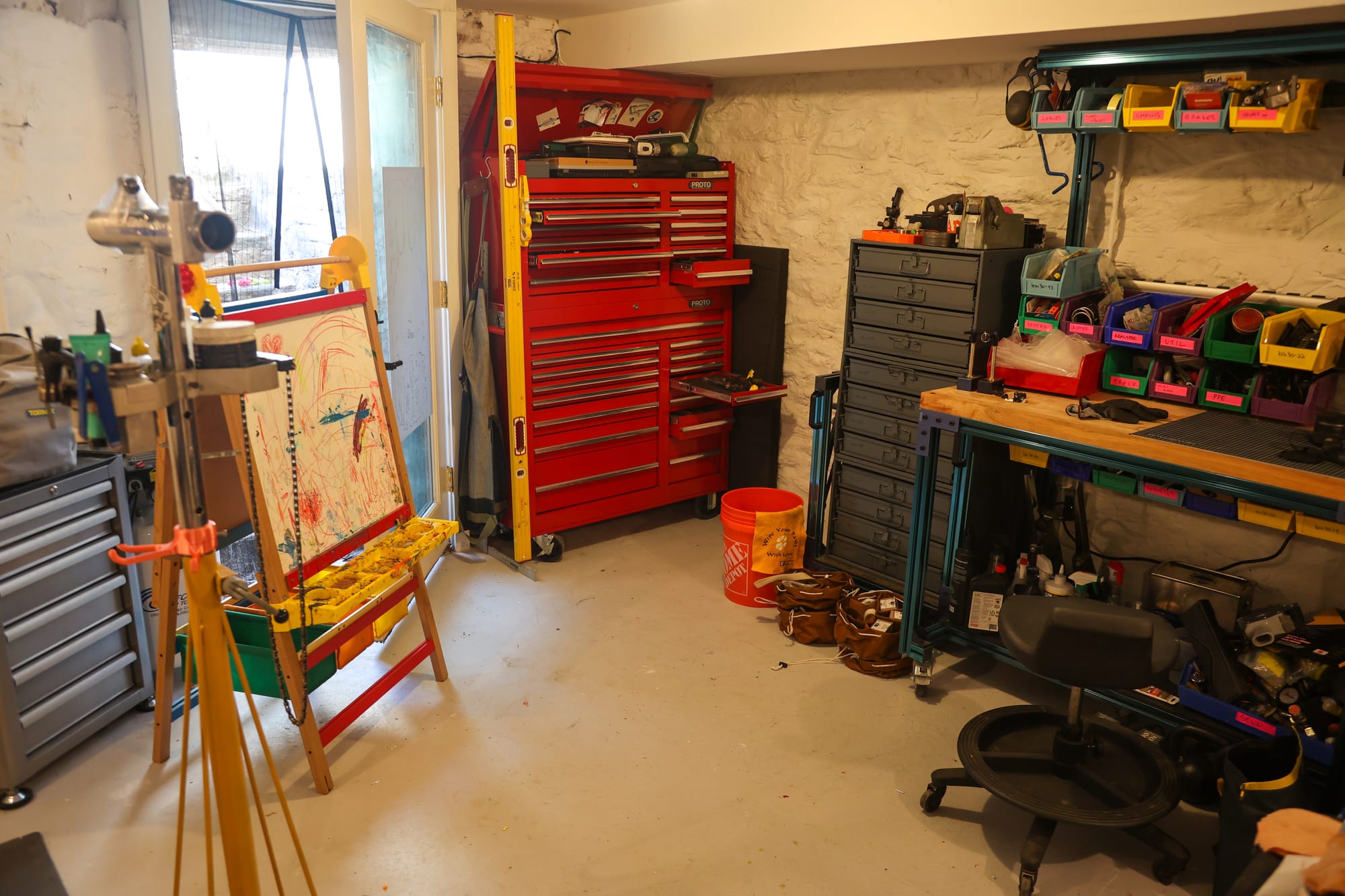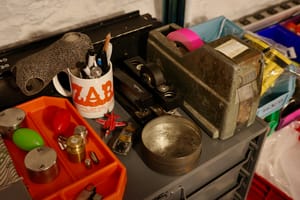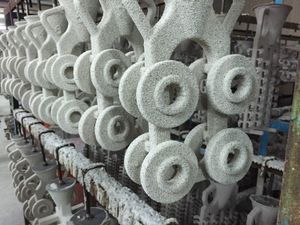I am a working person. I have a career, and I have a job, and that job is to write these words. Writing these words takes, I don’t know, maybe a day and a half per week, but when I’m done I’m done, I send it and go to bed and in the morning, when the sending actually happens, I typically don’t think that much about the words that I’ve sent. Then the rest of the day is spent trying to find new words to write. This is interspersed, of course, with the administrative work of running a business: Replying to your emails, trying to make heads or tails of our analytics, clearing spam signups (so many spam signups!) from our subscriber roles. But it’s the thinking up new words part that’s the squishiest, the most open-ended, the hardest to track.
I bring this up because a few days ago, on the recommendation of multiple people, I listened to Ezra Klein’s recent podcast in which he interviews Caitlyn Collins about parenting and the idea of a work-life balance. I paired this with Ezra being interviewed about the media “apocalypse”; together, these two conversations track many of the struggles I’ve had over the past four years (the period during which this newsletter has been my full time job), and the three years before that (during which I became a parent) and come to think of it the three years before that (during which I made many of the decisions that now define my weekly routine).
Part of the reason I wanted to name this newsletter Scope of Work is that I have struggled to define the scope of my own work. But I am getting better at it, I think, and at minimum am ready to write some new words about it today.
PLANNING & STRATEGY.
Around the beginning of this year I began waking up early. Not the earliest of my career: That would have been around 2011, when I set my automatic coffee machine to begin grinding beans around five in the morning, creating a horrible noise which resonated throughout my studio apartment. By six forty-five I had jogged, showered, and driven a half hour, the rising sun in my rearview mirror as I rushed in to the little R&D shop I was running at the time. I wanted to be there before anyone else, so that I could walk around the shop with a clear head, thinking through the state of our various projects. I also wanted everyone else to notice that I was early, and to infer something from that – about the day, about the arc of our work, about me.
My motivations are different now: I mostly want to make the point to myself that I can still wake up early, and that I can roll out of bed and sit down at a laptop and put thoughts into words. Sometimes I write about something that has happened to me; sometimes I write about the things I need to do that day; sometimes I vent, letting my feelings pour out until I have been drained of them, and then I can archive the draft and move on to my day.
The twist in all of this – which is one of the reasons for which the Ezra Klein podcast on parenting was suggested to me – is that after a week or so of productive morning writing, my kids began waking up shortly after me, and just as I am sitting down to write I can hear them stumble out of bed, and pit-pat down the stairs, and then there they are, sleepy and beautiful and wanting nothing other than to curl up in my lap and look at pictures of our family. The first time this happened it was charming; the second time it was slightly challenging; now I accept and even look forward to the interruptions. They often occur only a few minutes after I’ve gotten to work, but the point has already been made: My workday has begun, and my commitment to my work is intact. But my work exists within the real world, and ultimately it needs to respond to real world conditions.
MAKING & MANUFACTURING.
I think – and I’m not totally sure on the details here – that a big part of my job during the meat of the day is to leave the house, and observe other people working, and maybe talk to them about it and then write something about what I’ve observed. This is a new practice for me, and in a good version of the future I’ll fail at it repeatedly, and in a good version of the future you’ll stick with me anyway, give me credit for trying, see the promise there and believe in the validity of the project and we’ll all come back together in a couple of days and try again.
What kind of work should I observe, and write about, and send to you? Today, I am writing about my own work. I’m planning to publish a few things about construction work soon (some written from a distance, some up close), and a few about factories (some large ones, potentially on multiple continents), and am scoping out a few smaller workshops to lurk in as well (these will be as varied as possible). I’m curious to write about industries I’ve worked in and adjacent to: electronics assembly, architectural glass, bicycles, product design. But I’m also looking outward, to the modern rubber industry, and to food production, and ultimately to whatever opportunities present themselves. All of which is to say that I am soliciting proposals; if you’ve got something that you think I should turn my gaze to, you can send it here.
MAINTENANCE, REPAIR & OPERATIONS.
A few years ago my family had to fire our nanny, and for three or four months I was responsible for afternoon childcare. A week or two into this period, I found myself struggling to focus on the task. I would bring my kids to a playground and then find myself half-consumed by my phone, preoccupied with (and also unable to act upon) all the professional obligations which were piling up during my shortened work week. There was nothing to be done about it – no additional bandwidth to be found, no realistic path to reducing my workload. I solved the problem by exacerbating it: Instead of finding more time for my work, I made sure to spend at least forty minutes exercising before the childcare commenced.
Since then, the role that exercise plays in my life has expanded. It is decidedly not work, and it is entirely self-serving, and I’m not really sure what more to say of it other than that it has been incredibly rewarding to change my perspective on the way exercise can fit into my life.

DISTRIBUTION & LOGISTICS.
I’m about, I don’t know, a third of the way through moving my tools out of the workshop I ran in Bed Stuy for the past five years. A corner of my basement is now mostly set up: Tool chest, workbench, bike stand, air compressor, sharpening station. This corner is reassuring and invigorating, and I’m excited to augment it with a few new tool purchases, and I’m excited also to let some treasured tools (these ones) go on to new owners at a fraction of their original costs.

The process of moving itself has also been remarkably fulfilling. I’ve owned some of these tools for almost twenty years, and have moved them eight or nine times, and it’s always interesting to see them in a new context, and to reevaluate their utility, and to find new ways to arrange the jigsaw puzzle that is my workshop. I’ve even found the manual labor to be downright enjoyable: Bundling things up with kraft paper and stretch wrap; nesting bundles together in hinged-lid bins; loading bins onto stolen (not by me) Home Depot carts, which roll jankily through the rough concrete hallways of my old workshop’s building. Operating the freight elevator, negotiating the loading dock… the whole activity is complex and technical, and requires weeks of planning and hours of deliberate work. And I’ve become, somehow, proficient at it: I know my abilities and my limitations, and can estimate both the time that a task will take and the emotional toll it’ll cause me.
INSPECTION, TESTING & ANALYSIS.
I wrote above that I don’t think that much about what I’ve written and sent after I’ve sent it. The exception to this is when I receive negative feedback, which happens maybe once or twice a month and which I find challenging. So as Craig Mod recommends about halfway through his “five years of memberships” essay, I started a text file on my computer called you-are-not-a-piece-of-shit.txt. In it, I put the nice bits of feedback, just to memorialize them and for future reference in trying times. It helps.
SCOPE CREEP.
One thing I’d like to write more about is manual motions – things that people do with their hands, sometimes in fluid movements and sometimes jerkily, accomplishing some small task with dexterity, or effort, or grace. In this vein I have been thinking a lot about the manual tasks which have immersed me. I enjoy the rhythm of mopping a well-swept floor. I am annoyed with the placement of my kitchen sink, which seems to thwart my attempts to scrape vegetable trimmings off a cutting board. I find the coordinated process of taking a puff from my inhaler (pop the lid off—shake the whole contraption as you synchronize your inhalation—put it to your mouth and squeeze just as an inhale ramps to full force) to be highly satisfying.
One motion I have gotten decently good at is folding a car’s side-view mirror. The car to which the side-view mirror belongs is not mine; I’m on my bike, in the bike lane riding who knows where, and the car is double-parked in said bike lane. Sometimes the motion comes decisively: Car traffic is backed up all around me, and I am stopped next to the mirror, unable to move because of it. Eye contact is typically not made, but I assume some mutual understanding between me and the mirror; my feet are planted on the ground, the motion is deliberate, thu-unk, and I move on. But sometimes it’s more spontaneous. I’m at speed, the double-parking is a bit much, and without stopping I reach out and give a flick. The mirror can’t have seen it coming – the driver, if they’re even around, certainly didn’t either – and then I’m gone, propelled forward by the interaction, the road arguably a little safer for the next person.
Thanks as always to Scope of Work’s Members and Supporters for making this newsletter possible. Thanks also to James and Mike for recommending the podcast episodes, and to Chad for helping move my crap.
Love, Spencer





